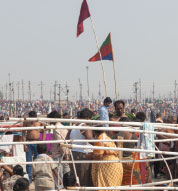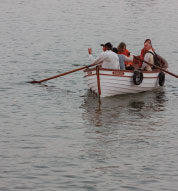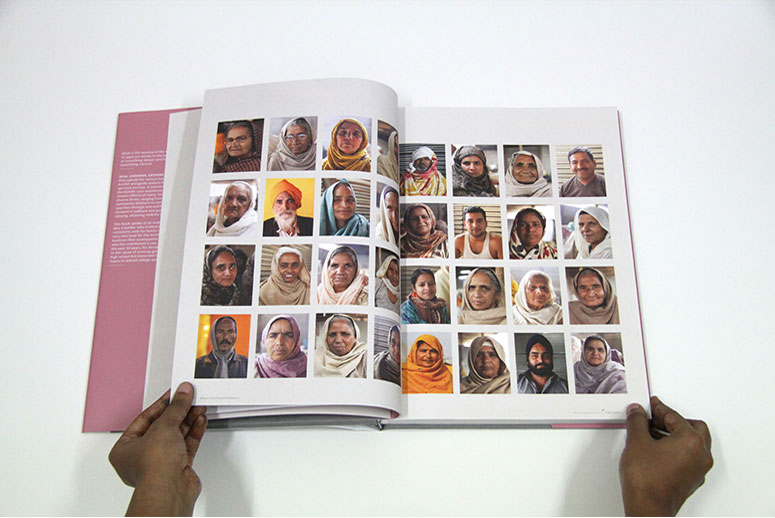- Voices in the book
- Preface
- Maps and Navigation
- Vol 1: Place, Time, Astronomy
- Vol 2: History, Mythology, Belief
- Vol 3: Ganga, Yamuna, Saraswati
- Vol 4: Seva, Sadhana, Satsang
- Vol 5: Guru, Disciple, University
- Vol 6: Abstinence, Penance, Charity
- Vol 7: Faith, Fate, Worship
- Vol 8: Services, Sellers, Spectacle
VOL 4: Seva, Sadhana, Satsang
What is the essence of the Kumbh? To open our minds to the possibility of something deeper and higher. Something visceral
Seva, Sadhana, Satsang are the pillars that uphold the various teachings of the Kumbh and guide seekers through a spiritual journey. A massive event such as the Kumbh runs seamlessly due to the tireless efforts of many. Seva takes diverse forms, ranging from cooking in community kitchens to conducting searches through lost-and-found camps. Steeped in sadhana and guided by satsang, attaining moksha is the end goal. This book speaks of an Australian farmer, also a builder who trotted across continents with his family to build his very own boat for the Kumbh, a local boatman that accompanies him, a guru who has maintained a vow of silence for the past 30 years, his disciples dedicated to the cause of running goshalas and a high school kid immersed in seva, who hopes to attend college someday.
Contents of place, time, astronomy:
 Mine is a song of victory (Poetic Verse)
Mine is a song of victory (Poetic Verse) Sadhvi Bhagwati Saraswatiji (Insight)
Sadhvi Bhagwati Saraswatiji (Insight) Seva, Sadhana, Satsang (Introduction)
Seva, Sadhana, Satsang (Introduction) Andrew Turner (Interview)
Andrew Turner (Interview) Journeying with Ram (Character Story)
Journeying with Ram (Character Story)
 Nirbhayadas Kothariji (Insight)
Nirbhayadas Kothariji (Insight) Moved by love (Photo Story)
Moved by love (Photo Story) Mauni Baba and his disciples (Interview)
Mauni Baba and his disciples (Interview) 08.02.2013 (Diary Note)
08.02.2013 (Diary Note) 11.01.2013 (Diary Note)
11.01.2013 (Diary Note)
Excerpts From The Book: Sadhvi Bhagawati Saraswatiji (insight)


Excerpts From The Book: andrew turner (interview)



Andrew Turner is as much at home in the bustling Kumbh as he is in an avocado and blueberry farm, tucked away in a scenic village of New South Wales, Australia. Comboyne is home to Andrew’s family of six and his initiative called Sustainable Timber Frames. His life decisions reflect his tendency to take the road less travelled, hoping to encounter deep and diverse experiences and enjoy the ride while getting there.
Q So you built this boat? A. Yes, we built this boat. We came to India in the beginning of October, spent a month in a goshala outside of Varanasi at a place called Rameshwar. And then, we came here. We got here in November. And we started looking out for material here.
Q So everything you required to build the boat has been sourced from here? A .Except the copper nails. We brought those from Australia. We were not sure if we would find the same quality here. So it was easier to bring our own. But everything else is sourced from here, in Allahabad.
Q When you say 'we', how many is that? And are all of you from Australia? A. At the moment there are about 11-12 of us. My wife is Canadian, Karuna is Canadian – she is here. She is an Indian woman we met when we lived in Canada. Our boat is named Karuna after her. But we also decided to call it Karuna, because it means mercy. Mercy is one of the four main principles of Buddhism and I thought it would be good to represent a different point of view here at the Mela. Then we have Jeff who is from the States. Rob and James here are brothers.
James lives in New South Wales and Rob in Darwin. We all sort of just came here and got together and decided that we were going to do this. I have been doing this for 24 years.
Q Would you say you were looking for something the first time you visited the Kumbh, or was it just the joy of a new experience that got you here? A. I just wanted to be part of that mass human gathering. I wanted to witness having so many people together in one spot. I knew it happens only once every 12 years, and it is the biggest gathering on Earth. It just is fantastic. I felt moved the first time I was here. That is why I thought I had to come back
Q So are your kids here as well? A. Yes, our whole family is here, including all my 4 kids – 2 boys and 2 girls.
Q Were you worried about bringing them here? A. I was worried about them falling ill. It is easier for us grown-ups, but I was worried about the younger kids. In fact the two boys did fall ill. They were in hospital with bacterial gastroenteritis. The hospital experience though harrowing in the beginning turned out okay in the end. In fact the people we are now staying with, we met there.
Q Do your kids want to go back home? A. Yes, especially the girls, the twins. For them, India will seep into their consciousness, just like it did for me. When I am here, I look at the people, take in how the boats are built, listen to the singing. Maybe they are not doing all of this. I guess they are seeing the Mela from a child-like perspective, but I hope that the passion here will seep into their lives. You know, for us bringing our kids here is an educational experience. We home-school our kids back in Australia. So even when they are here, they are learning, picking up a different language, observing new customs and learning about a new culture.





